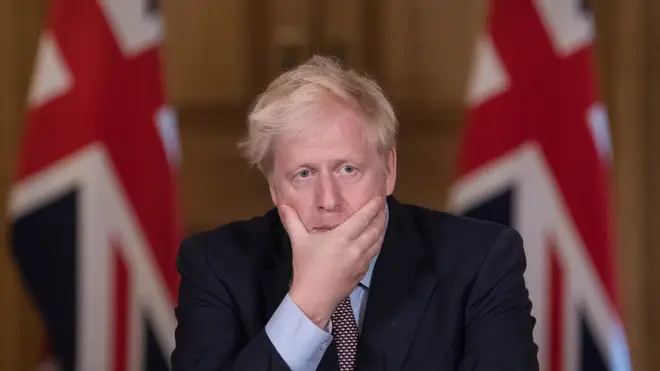
Matthew Wright 7am - 10am
10 September 2020, 11:41

Leaked documents have a revealed multi-billion pound government plan that looks to a mass testing regimen as a way to live alongside coronavirus.
Named "Operation Moonshot", the plan appears to set out a beacon toward retrieving some normalcy while a COVID-19 vaccine remains in development.
So what exactly is the government planning?
The UK-wide plan is to ultimately see 10 million COVID-19 tests processed every day.
Such a test would be taken by using a saliva swab and would return results with 20 and 90 minutes, without being processed in a lab.
A government briefing memo seen by the British Medical Journal (BMJ) estimated the programme would "cost over £100 billion to deliver".
To put this into perspective, the cost is almost as much as the £114 billion budget for NHS England in 2018/19.

Hancock hopes fast testing will help open theatres and sports venues
"Moonshot thinking" is a phrase used to describe an anything-is-possible mindset, and is usually reserved for ideas that might be considered groundbreaking - or near-impossible.
In fact, Google has used the term "moonshot" for a number of its experimental projects, including Google Glass and the driverless car.
Operation Moonshot, therefore, could be a sign of the government's admission to the challenging nature of such a target.
Ten million sub-hour tests a day is obviously an ambitious target, especially considering the ongoing criticisms about meeting demand in the current testing regimen.
To put this into perspective, Transport Secretary Grant Shapps said on Thursday that 1.2 million tests were currently being carried out every week, with a capacity of 300,000 per day.
The last daily figure to be released, on 2 September, revealed 175,687 tests had been carried out in the 24-hour period, with a capacity for 369,937.
Therefore, there is still a huge gap between current capacity and Moonshot's target.
READ MORE: Concerns raised over '£100bn cost' of Moonshot Covid-19 testing plans
Also on Thursday, Mr Shapps admitted the necessary technology does not yet exist to achieve such a goal.
He told Sky News: "This is technology that, to be perfectly blunt, requires further development - there isn't a certified test in the world that does this but there are people that are working on prototypes."

Caller confronts Matt Hancock after being told to travel 341 miles for a Covid-19 test
There has been some notable skepticism among experts over the proposal, especially as it was revealed amid ongoing criticism about the current scheme.
It comes after months of notable bumps in the road with initial testing plans, starting with the widely-reported government target to reach 100,000 tests per day during lockdown at the end of April.
Further criticism has since surfaced, also about meeting demand.
READ MORE: Two trillion in debt: Rule of six must work to avoid lockdown and save UK plc
On Moonshot, deputy chief medical officer, Dr Jenny Harries, said the project's success would depend on how it is handled.
She told ITV's Robert Peston: "We do want to get back to as much normality as we can and any opportunity to do that through a new testing programme or using different testing technology is clearly a good thing to be following, but it's not quite as simple as just doing that."
READ MORE: Heathrow boss urges Government to fast track 20-second Covid test
Dr Chris Papadopoulos, principal lecturer in public health at the University of Bedfordshire, told LBC’s Nick Ferrari: “In principle, mass testing on that kind of scale would be enormously beneficial to us but it lacks any credibility to me.
"There have been many claims about testing capacity… and they haven’t really come to bear. Our testing systems have been very bumpy."
"To get this working messaging is going to be absolutely vital. My fear is at the moment people just aren’t going to buy into it."
READ MORE: France records 8,577 new Covid-19 cases in 24 hours
Mixed reviews have been received from the scientific community, including from Dr Chaand Nagpaul, council chairman of the British Medical Association (BMA), who said it was unclear how it would work given the "huge problems" currently seen with lab capacity.
Professor Sir David Spiegelhalter, meanwhile, said the project could lead to hundreds of thousands of people being unnecessarily labelled as having coronavirus.
He said: "Statisticians are just sort of banging their heads on the wall at this, because mass screening always seems like a good idea in any disease - 'Oh yes, let's test everybody'. But the huge danger is false positives - no tests are perfect, it is not a simple yes/no thing.
"And if you're going to have a test that would allow someone into a theatre or allow them back to work, you're going to have to be really sure they're not infectious.
"And so you have to set a threshold that is not very sensitive, that will pick up anything that hints at being infectious. That means that such a test will always generate a very large number of false positives.
"That doesn't matter so much perhaps if you're just being stopped going into a theatre - the point is it is not just a matter of testing.
"You've got this whole downstream business that that person will be told to isolate, their contacts will be told to isolate, and so on.
"And if you only have 1% false positives among all the people who are not infectious, and you're testing the whole country, that's 600,000 people unnecessarily labelled as positives."